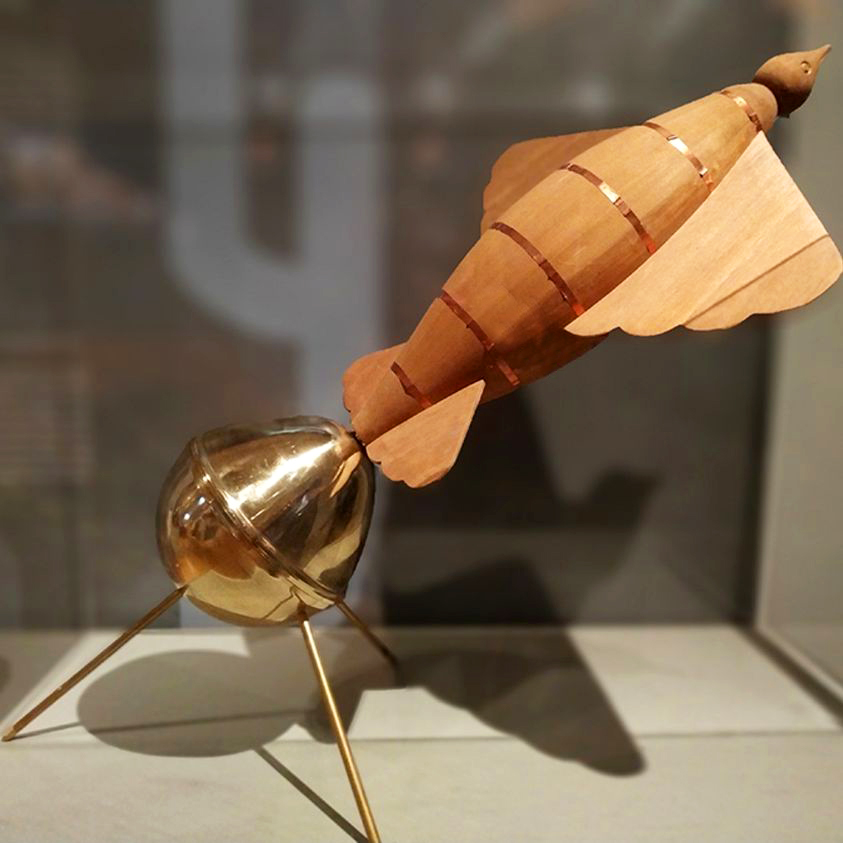created 2025-06-10, & modified, =this.modified
tags:y2025engineeringgreekbirds
rel:Sky Cycle, Carl and Mary Myers
Thought
In Art-Science - Alloys by Iannis Xenakis dialogue there’s an exchange about how fugues are relative automaton. These pigeons are referenced.
This is bird shaped, but also a primitive rocket? We landed on the moon from following the path of this bird-thing?
Archytas was a Greek philosopher born in 428BC.
His pigeon is thought to be the first-ever self propelled flying device.
It was made of wood, hollow and of cylindrical shape, with wings projecting from the sides.
Meanwhile, the rear of the flying pigeon had an opening that led to the internal bladder. This opening was connected to a heated, airtight boiler. As the boiler created more and more steam, the pressure of the steam eventually exceeded the mechanical resistance of the connection, and the flying pigeon took flight. The flight continued for several hundred meters.
It might have been aided by a wire.

It’s sole mention in antiquity:
Archytas made a wooden model of a dove with such mechanical ingenuity and art that it flew; so nicely balanced was it, you see, with weights and moved by a current of air enclosed and hidden within it. About so improbable a story I prefer to give Favorinus’ own words: “Archytas the Tarentine, being in other lines also a mechanician, made a flying dove out of wood. Whenever it lit, it did not rise again.”
Reference in Art-Science - Alloys by Iannis Xenakis
Michel Serres, “Why is a fugue an automaton?” and his reply speaks volumes about the cybernetic implications this style of creating music has on human consciousness. The conversation, in its own way, sums up his continual dialog with the notion that music and science go in cycles— for Xenakis, music is usually the forerunner of other conceptual developments that occur in society. Their conversation was as follows:
Michel Serres: Once again, musical thinking is in the forefront. What do you mean when you say that the fugue is an automaton, that “the fugue is an abstract automaton conceived two centuries before automated science?” I don’t believe this is true. I think they coincided, if science didn’t appear first.
Iannis Xenakis: Oh no, not automated science. Automated science was born in the 20th century.
Michel Serres: Not automated, but the construction of automatons.
Iannis Xenakis: That makes a difference, because the use of automatons dates from Alexandrian times.
Michel Serres: In A Thousand and One Nights, for example, there are automatic fountains, water machines.
Iannis Xenakis: Yes, but A Thousand and One Nights dates from the 12th century, the use of automatons occurs much earlier than that. The Alexandrian period already knew Heron and the first steam engine.
Michel Serres: Yes, even Archytus’s Dove.
Iannis Xenakis: All of these are concrete inventions. It was music, however, which introduced its abstraction.
Michel Serres: So then, why is a fugue an automaton?
Iannis Xenakis: I think that it corresponds more or less to the definition of a scientific automaton which came about in the twenties, thanks to Weiner and cybernetics. It can be summarized in the following manner: An automaton is a network of causes and effects, meaning a temporal chain of events, eventually coupled or multicoupled with certain liberties. An automaton can be closed. It suffices to plug in energy and it works cyclically. It can be relatively open, complete with data entries and external actions, thanks to the help of buttons, for example. Every time new data entries are given, an automaton can produce different results, despite the internal rigor which defines it.
Michel Serres: Its syntaxes are repetitive but not its performances.
Iannis Xenakis: Yes, its syntaxes are repetitive. Why? Because there is an internal structural rigor.
Michel Serres: Is the fugue’s syntax always stable?
Iannis Xenakis: The fugue does not constitute such an absolute automaton; it is a relative automaton, especially when compared to the automatons studied by science, which are relatively rigorous in relation to musical ones. When I say musical automaton, I consider that a minuet is also an automaton. The value specific to musical invention is that it was the first to give, to create an abstract automaton, meaning that it produced nothing except music …